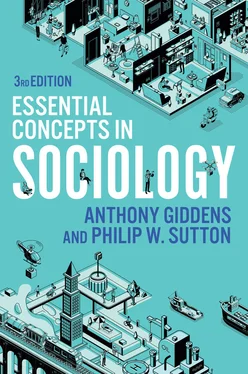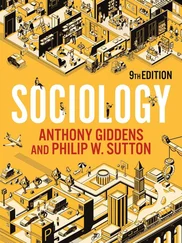Studying human beings is clearly different in some ways from observing events in the natural world, so maybe sociology and the natural sciences can never be identical. Human beings do not merely act on instinct or through some biological imperative but interact with each other in meaningful ways. This means that, in order to describe and explain social life, sociologists need to find ways of understanding why people act in the ways that they do. People generally behave according to intentions, and sociologists will often reconstruct the meanings individuals attached to their own actions. To grasp the behaviour of frogs involves no such reconstruction of complex mental reasoning. The meaningful nature of human action is both an advantage and a problem. Sociologists cannot simply adopt the methods of successful natural sciences such as biology or chemistry but must devise their own methods that are adequate for their specific subject matter – human beings and social life. One important advantage is that sociologists can speak directly with their research participants and understand the responses they get. This opportunity to converse with the participants of research studies and to confirm one’s interpretations means that sociological findings are, at least potentially, even more reliable (different researchers would arrive at the same results) and valid (the research actually measures what it is supposed to) than those from the natural sciences. Max Weber saw such gains as crucial to the scientific status of sociology. Even though its methods are necessarily different, they are no less systematic, rigorous and theoretically informed than those of any other science.
Yet sociologists face some problems that natural scientists do not. Self-aware individuals may subtly alter their usual behaviour when they know it is being studied, thereby invalidating the researcher’s findings. For instance, in daily life people constantly attempt to manage the presentation of their self to others, and this process of ‘impression management’ may occur during sociological research. Sociologists must be aware of the distinct possibility that, during interviews and questionnaires, respondents may offer the answers they believe the researchers are looking for. These various issues illustrate a key feature of studying human beings – the problem of reflexivity.
Sociological knowledge filters back into society and becomes part of the very same social context being studied, potentially altering that social context. Social reflexivity has no counterpart in the natural sciences, which means that, if it is a science, sociology cannot simply adopt the same methods as natural science but must develop its own ‘object-adequate’ methods.
A fundamental problem with the notion that sociology should be scientific is that it presumes agreement on what constitutes science. Although this used to mean simply looking at what the natural sciences do, this is no longer the case. Several important studies by historians of science have eroded the certainty which used to exist in relation to science. Thomas Kuhn (1970) studied breakthroughs in science – scientific revolutions – which we might expect would occur as a result of knowledge accumulation over long periods. In fact, Kuhn saw natural science operating through ‘paradigms’ – ways of doing science based on particular theories. ‘Normal’ science was essentially a continual testing and retesting of the paradigm, which did not lead to major advances. Breakthrough moments happened when someone went beyond the paradigm to resolve an anomalous finding which then led to a new paradigm.
A further blow to the ideal typeof science came from historical studies of scientific methods by Paul Feyerabend (1975). He argued that many revolutionary discoveries in science had nothing to do with scientific method. Instead, they came about through simple trial and error or even by mistakes and chance occurrences which simply cannot be taught. Feyerabend’s conclusion was that there is only one important principle of scientific method – ‘anything goes’. Only by encouraging deviancefrom the scientific model could innovation be safeguarded. Sticking rigidly to one method was merely a recipe for stagnation and a lack of progress. Hence, after many decades of trying to work out how sociology could mimic the methods of the natural sciences, by the 1980s it no longer seemed a worthwhile exercise.
The immediate response of governments around the world to the Covid-19 pandemic of 2019–21 was to turn for advice and guidance to epidemiologists and medical science. This was clear evidence that science is still viewed as a superior form of knowledge compared to theological knowledge or common-sense ideas. The basis of this superiority seems to be rooted in the practical successes of science rather than in a widespread understanding of scientific methods. In sociology, there has long been disagreement on whether it is desirable for the discipline to be and be perceived as ‘scientific’, which seems to have settled into an established divide over what are appropriate research methods.
Schwemmer and Wieczorek (2020) argue that this divide can be seen in studies that adopt predominantly qualitative or quantitative research methods. They maintain that this division makes sociology a ‘low-consensus discipline torn between rival camps aligning themselves epistemologically either to the natural sciences or the humanities’ (ibid.: 4). These camps are located in different philosophies of science. Those leaning towards humanities favour constructivism and logical induction, while those looking to the natural sciences align with positivism and the deductive method. Academic journals tend to be seen as focusing on subjects that lean towards quantitative or qualitative work, and this unintentionally reinforces already entrenched positions. However, Schwemmer and Wieczorek’s study also found evidence of this divide in their sample of the more generalist sociology journals between 1995 and 2017. Hence, in spite of more recent trends in mixing research methods from across the divide, this paper suggests that longstanding issues concerned with the scientific status of the discipline remain embedded within the structures of sociological discourse.
References and Further Reading
Benton, T., and Craib, I. (2010) Philosophy of Social Science: The Philosophical Foundations of Social Thought (2nd edn, Basingstoke: Palgrave Macmillan).
Chalmers, A. F. (1999) What is this Thing Called Science? (3rd edn, Maidenhead: Open University Press).
Feyerabend, P. (1975) Against Method (London: New Left Books).
Fuller, S. (1998) Science (Buckingham: Open University Press).
Kuhn, T. (1970) The Structure of Scientific Revolutions (Chicago: University of Chicago Press).
Schwemmer, C., and Wieczorek, O. (2020) ‘The Methodological Divide of Sociology: Evidence from Two Decades of Journal Publications’, Sociology , 54(1): 3–21.
Social Constructionism
Working Definition
An approach to sociology which is agnostic towards the reality of social phenomena, preferring to investigate the way that these are produced within social relationships.
The origins of social constructionism can be traced back to the ‘social problems’ perspective of the early 1970s, which saw social problems as claims on people’s attention and the state’s resources. In a competitive claims environmentwhere there are always too many claims for the available resources, this perspective analysed how some claims are able to rise to prominence while others are neglected. However, constructionism today also draws on ideas from the sociology of scientific knowledge (known as SSK), which studies the social processes underlying knowledge production. SSK sees scienceas itself a form of social activity which must therefore be amenable to sociological investigation. Scientific theories are products of their society, and SSK has often questioned their apparently ‘universal’ validity.
Читать дальше












